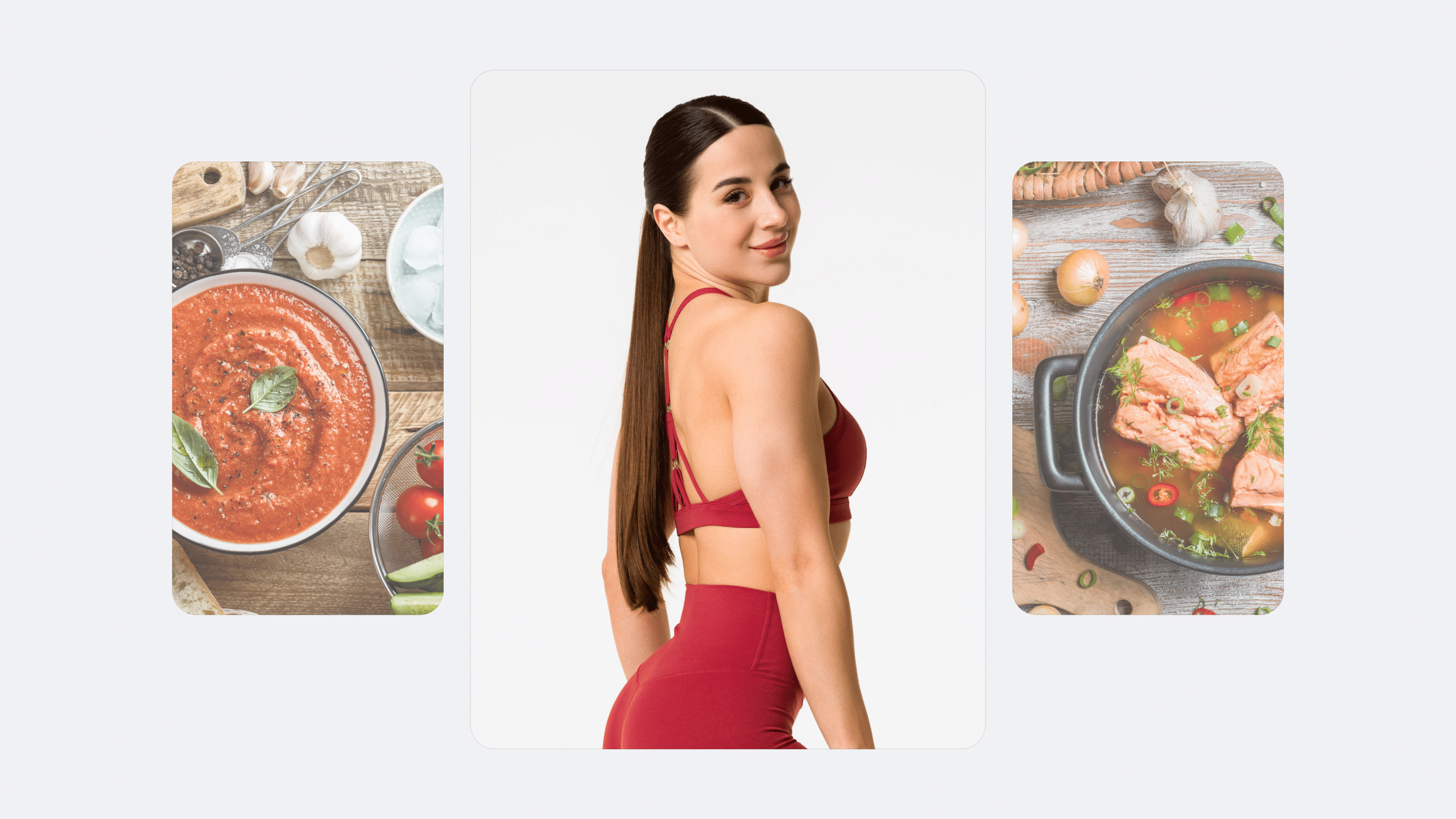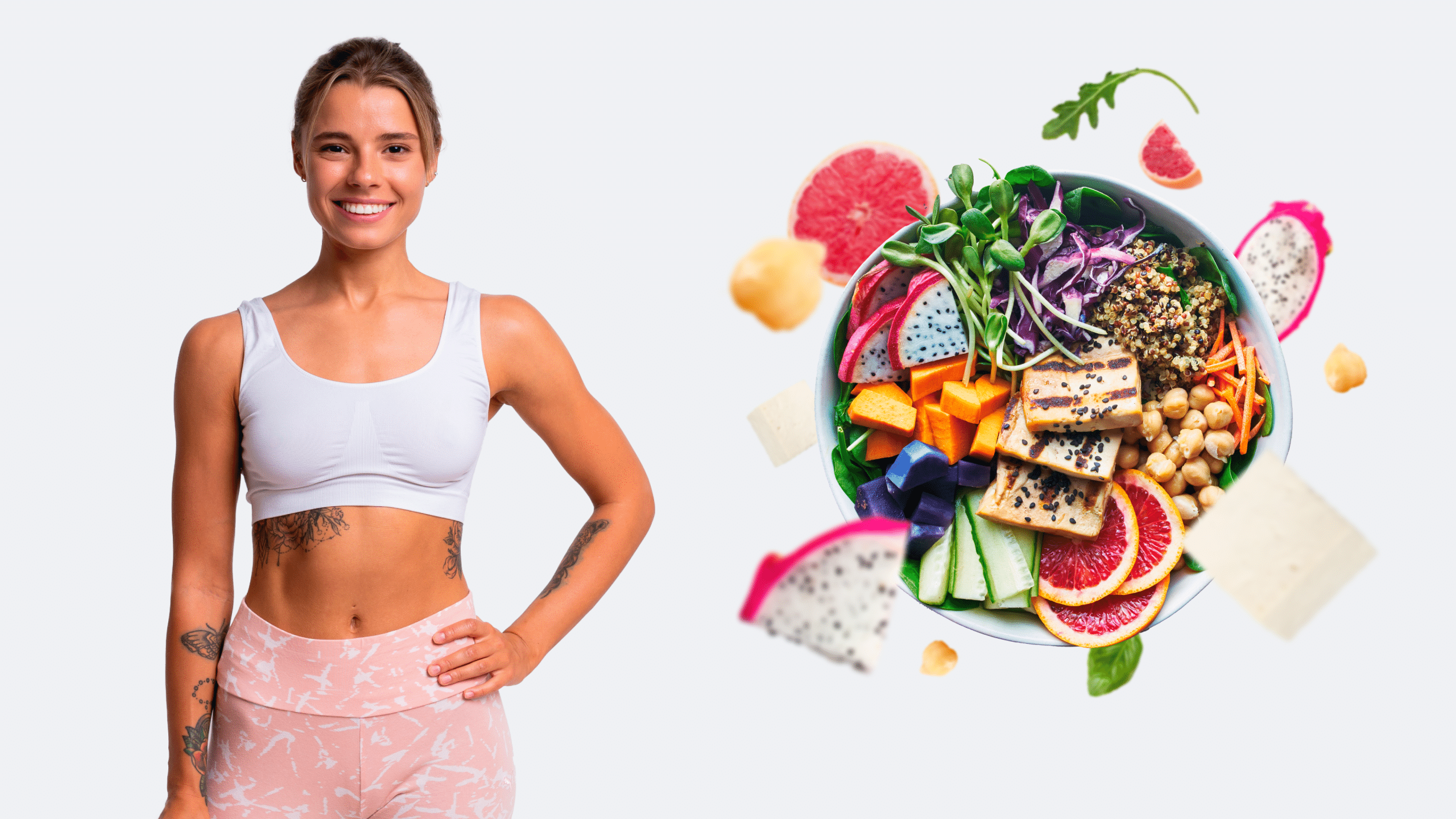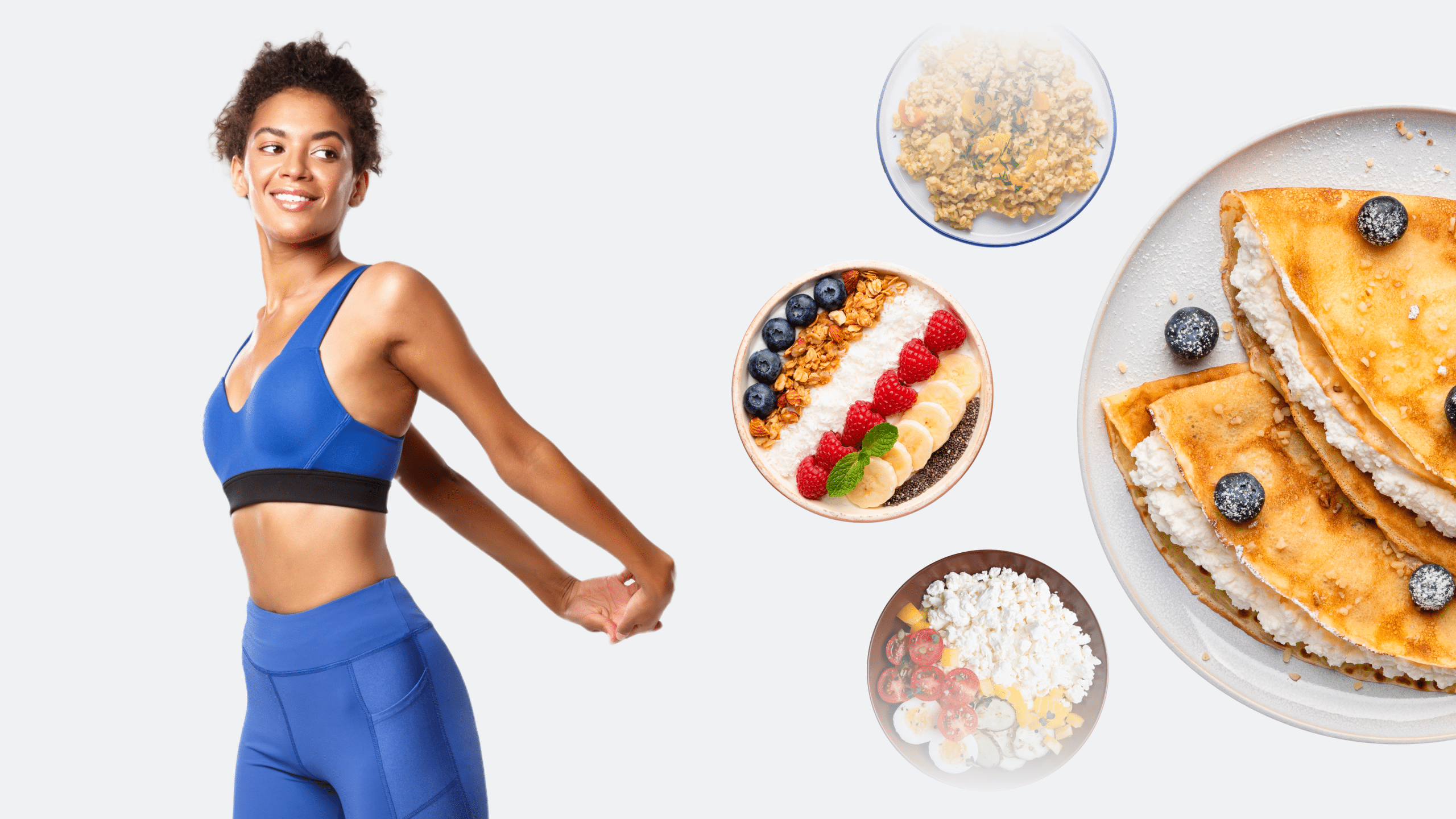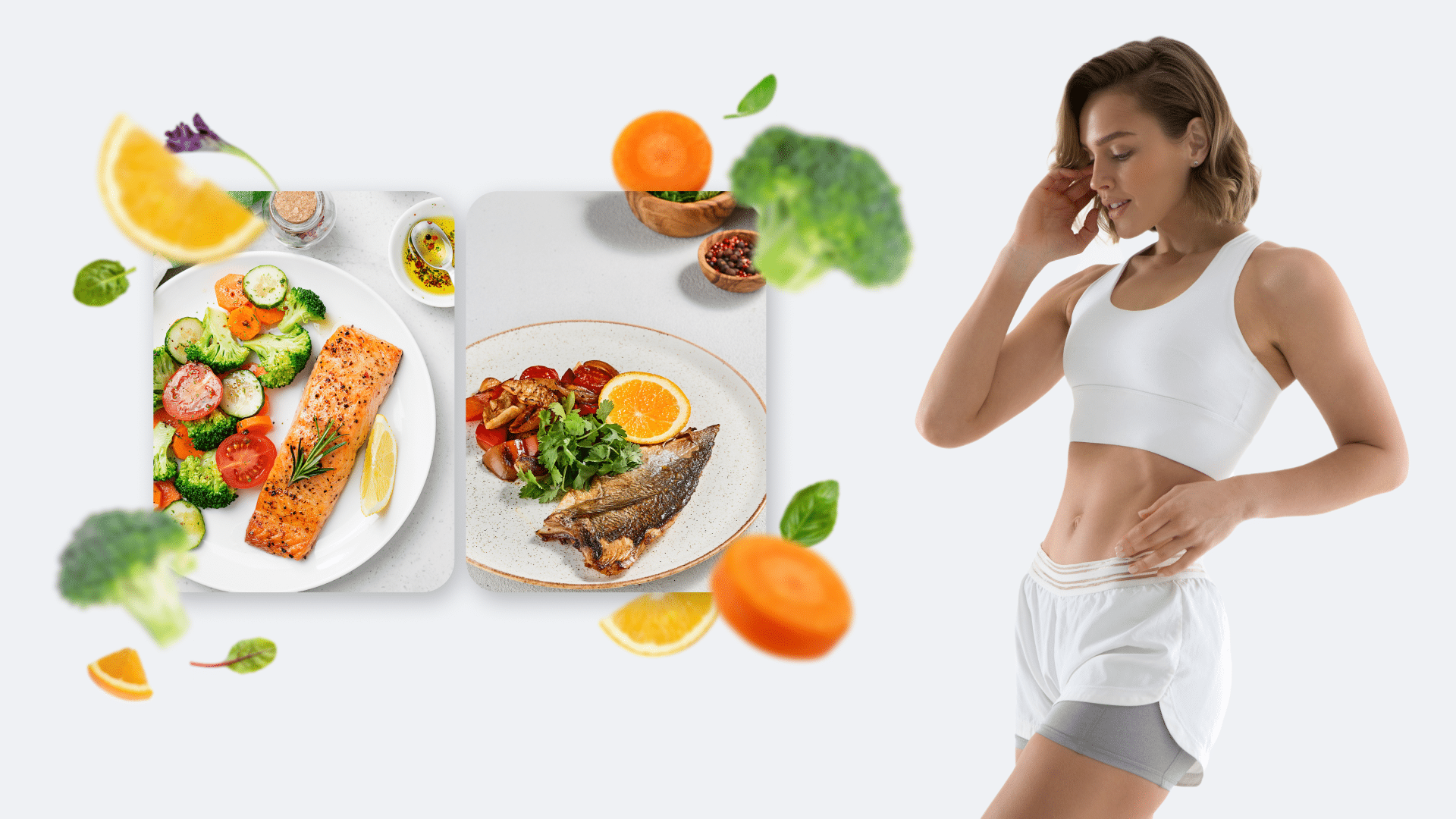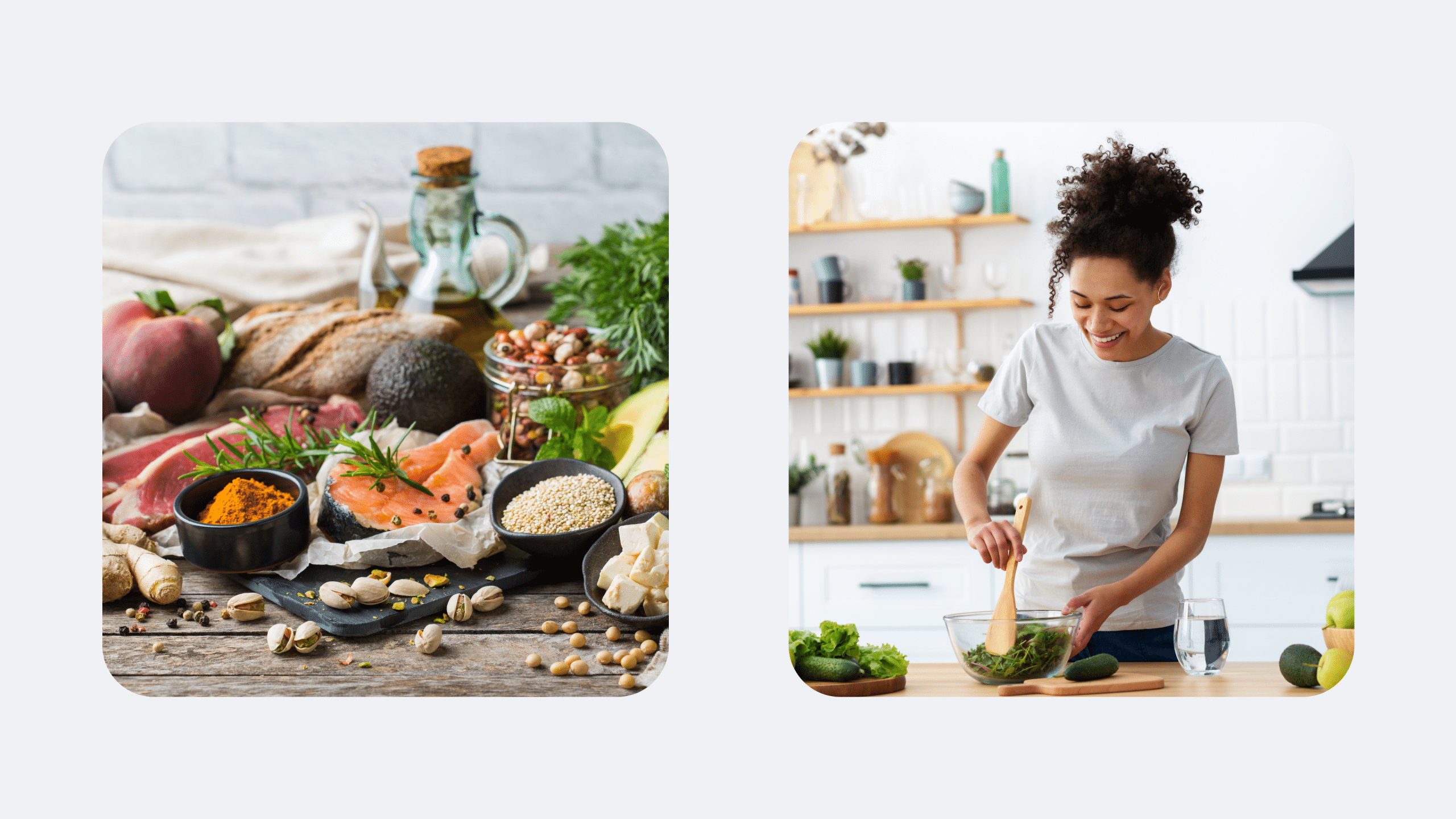In a modern world, where temptation reigns supreme and convenience takes precedence over nutrition, the no processed food diet seems essential. A no processed food diet, also called clean eating or a whole foods diet, is a dietary approach with a focus on consuming whole, unprocessed foods. This type of diet eliminates or significantly reduces ultra-processed foods and foods that are high in unhealthy fats, sugar, and salt.
There are many potential benefits to a no processed food diet. This type of diet may help you lose weight, lower your cholesterol levels, and improve your overall health.
Eating a diet rich in natural, nutrient-dense foods may also help reduce your risk of developing chronic diseases, including heart disease, diabetes, and cancer.
Before we delve into the intricacies of the no processed food diet, there are a few things you need to know. In this article, we’ll tell you about the benefits, give you a number of no processed food diet menu options, provide tips for following this type of diet, and supply you with practical ways to adopt this diet as part of your healthy lifestyle.
What Are Processed Foods?
Processed foods are food items that have been altered from their natural state. This can include the addition or removal of ingredients, in addition to changing the physical form of the food through methods such as cooking, milling, drying, canning, or packaging. Processing can be done by freezing, drying, or adding ingredients such as preservatives, sweeteners, flavorings, and colorings.
Intense sweat sessions, working weight loss tips, lip-smacking recipes come in one package with the BetterMe app. And all of it is at your fingertips, start transforming your life now!
Highly processed foods often contain unhealthy added ingredients such as added sugar, salt, and fat. They may also be high in calories and low in nutrients.
There are different levels of food processing:
- Minimally Processed Foods: Examples of these include washed and pre-cut vegetables, bagged salads, or roasted nuts.
- Moderately Processed Foods: These include canned vegetables, cheese, and freshly baked bread – foods that have undergone some processing but still retain their original characteristics.
- Highly Processed Foods: These are pre-packaged snacks, sugary cereals, frozen dinners, and fast food items that have undergone extensive processing and often contain extra additives.
Examples of highly processed foods include:
- White bread
- Canned soups and vegetables
- Frozen dinners
- Chips
- Cookies
- Cakes
- Pies
- Ice cream
- Processed meats, such as bacon and sausage
- Processed cheese
Differentiating processed foods from whole foods can be difficult. Generally, whole foods are those that have been minimally processed and are free of added ingredients. For example, an apple is a whole food, whereas applesauce is a processed food.
Another example is white rice. White rice has been milled and had the bran and germ removed. This processing makes it less nutritious than brown rice, which is a whole grain.
A few things that will help you understand the difference:
- Nutritional Content
Whole foods are rich in nutrients such as vitamins, minerals, fiber, and antioxidants, whereas processed foods are often stripped of essential nutrients during processing.
- Additives and Preservatives
Whole foods generally do not contain artificial additives or preservatives while processed foods can have artificial colors, stabilizers, and emulsifiers to enhance flavor, texture, appearance, and shelf life.
- Fiber Content
Whole foods, particularly fruits, vegetables, and whole grains, provide a wonderful supply of dietary fiber that improves digestion and keeps you feeling full, while processed foods lack sufficient fiber as processing removes or reduces the content. This can result in poor digestion and overeating.
- Energy Density
Whole foods generally have a lower energy density, meaning that they provide fewer calories for the same weight, while processed foods are high in sugars and unhealthy fats and have a higher energy density. This means that they contribute to a higher calorie intake.
While it’s possible for some processed foods to be part of a healthy diet, it’s important to limit your intake of highly or ultra-processed foods for a variety of reasons.
Why Are Processed Foods Bad for You?
There are several reasons why you should limit your intake of ultra-processed foods.
Unhealthy Ingredients
Significant processing often means that unhealthy ingredients are added to foods. These ingredients can include sugar, salt, unhealthy fats, and preservatives. Consuming too many of these ingredients over time may lead to weight gain, heart disease, and other chronic health conditions (5).
Lack of Nutrients
High levels of processing often remove important nutrients from foods. For example, milling grains removes the bran and germ, which contain most of the fiber, vitamins, and minerals. As a result, processed grains are often less nutritious than their whole-grain counterparts.
Convenience
One of the biggest problems with ultra-processed foods is that they’re often incredibly convenient. This is nice, but it can make it easy to overeat or consume more calories than you require.
Preservatives and Additives
Processed foods often contain preservatives and additives, some of which may be harmful to your health (2). While the FDA considers them all safe to consume, some people have questioned their long-term impacts on various aspects of health.
Some of the additives that are found in processed foods that are believed to lead to negative long-term health effects include (2):
- Butylated hydroxyanisole (BHA) – used as a preservative in cereals, snacks, and baked goods
- Nitrates and nitrites – used as preservatives in processed meats
- Monosodium glutamate (MSG) – used as a flavor enhancer in many processed foods
- Artificial food coloring – used for adding color to processed foods
- Sulfites – used as a preservative in dried fruits, wine, and processed foods
- Aspartame – used as an artificial sweetener in diet sodas and other processed foods
- Butylated hydroxytoluene (BHT) – used as a preservative in cereals and other processed foods
- Propyl gallate – used as a preservative in processed meats
- Tert-butylhydroquinone (TBHQ) – used as a preservative in cereals and other processed foods
Processed Foods and Weight Gain
There is an abundance of evidence suggesting that processed foods can contribute to weight gain. Some research has suggested that people who mostly eat ultra-processed foods are more likely to be overweight or obese than those who eat less of these foods (5).
One particular study found that a diet high in ultra-processed foods was associated with a higher body mass index (BMI), in addition to weight gain and increases in waist circumference (7).
Therefore, if you’re trying to lose weight or prevent weight gain, it’s best to limit your intake of ultra-processed foods.
Read more: The Banana Diet: Pros, Cons, and Everything Else You Need to Know
Processed Foods and Chronic Disease
There’s also evidence that suggests ultra-processed foods can contribute to chronic disease (5).
One study found a diet that is high in ultra-processed foods to be linked to a higher risk of heart disease.
Another study found that diets that are high in ultra-processed foods were associated with a higher risk of cancer (1).
This means that if you’re trying to reduce your risk of chronic disease, it’s best to limit your intake of ultra-processed foods.
Benefits of a No Processed Food Diet
- Nutrient Density: Whole, unprocessed foods support overall health and ensure your body receives the necessary nutrients for optimal functioning.
- Weight Management: Whole foods are lower in calories and higher in satiety, which encourages a mindful approach towards weight management.
- Stable Blood Sugar Levels: Whole foods, particularly those with a higher fiber content, regulate blood sugar levels. This means the risk of energy crashes, mood swings, and insulin resistance is lower (11).
- Improved Digestion: The more fiber you eat, the healthier your digestion will be – no bloating, constipation, or other digestive issues.
- Reduced Inflammation: Processed foods contain pro-inflammatory ingredients. A no processed food diet can help mitigate this condition.
- Heart Health: Cutting out processed foods that often contain trans fats and excessive sodium can keep your health healthy, lower cholesterol levels, and improve blood pressure control (8).
- Improved Mental Health: Nutrient-rich whole foods are a great support for brain function and mental well-being as they improve cognitive function, concentration, and mood stability.
- Enhanced Hydration: Many processed foods are often dehydrating, while whole foods improve hydration through water-rich fruits and vegetables.
- Better Skin Health: Whole foods are full of antioxidants that improve skin health and reduce signs of aging. Cutting out processed foods can also reduce the impact of inflammatory skin conditions (8).
- Improved Immune Function: Nutrient-dense foods support a healthy immune system, which helps fight off infections and illnesses.
- Positive Impact on Hormones: A balanced diet is essential for maintaining a positive influence on hormonal balance. Whole foods can support reproductive health and can alleviate symptoms relating to hormonal imbalances (9).
- Increased Awareness of Food Choices: A no processed food diet brings about mindfulness regarding your food choices, building a connection between your body and the source and quality of food you consume.
What Can You Eat on a No Processed Food Diet?
Whole, unprocessed foods are the foundation of a healthy diet. Here is a no processed food list that is safe to consume (10):
Whole Grains
A grain has three parts: the bran, the germ, and the endosperm.
The bran is the outer layer of the grain, and it is rich in fiber, vitamins, and minerals. The germ is the inner layer of the grain, and this is a good source of vitamin E, antioxidants, and B vitamins. The endosperm is the middle layer of the grain, mostly composed of carbohydrates.
Refining strips away the bran and the germ, leaving only the endosperm. This makes the grain less nutritious.
Examples of whole grains include:
- Wheat berries
- Brown rice
- Oats
- Barley
- Rye
- Quinoa
- Buckwheat
- Millet
- Amaranth
Vegetables
Vegetables are an essential part of a healthy diet. They’re full of vitamins, minerals, and antioxidants. They’re also low in calories and fat.
Examples of such vegetables, or foods that we tend to eat like vegetables include:
- Leafy greens
- Broccoli
- Cauliflower
- Carrots
- Sweet potatoes
- Squash
- Tomatoes
- Peppers
- Onions
Fruits
Fruits are an excellent source of vitamins, minerals, and antioxidants. They’re also a good source of fiber.
Examples of such fruits include:
- Apples
- Oranges
- Bananas
- Strawberries
- Blueberries
- Grapes
- Melons
- Avocados
- Figs
- Dates
- Raspberries
- Blackberries
Nuts and Seeds
Nuts and seeds are excellent sources of protein, fiber, vitamins, minerals, and antioxidants. They’re also a good source of healthy fats.
Examples of such nuts and seeds include:
- Almonds
- Walnuts
- Pecans
- Hazelnuts
- Brazil nuts
- Pistachios
- Cashews
- Flaxseeds
- Chia seeds
- Hemp seeds
- Pumpkin seeds
- Sunflower seeds
Whether you’re looking to simply pep up your fitness routine, jazz up your diet with mouth-watering low-calorie recipes or want to get your act together and significantly drop that number on your scale – BetterMe app has got you covered! Improve your body and revamp your life with us!
Healthy Fats
Healthy fats are an essential part of a healthy diet. They’re a great source of energy and help your body absorb vitamins. Healthy fats also play a role in brain function, heart health, and immunity (3).
Examples of these healthy fats include:
- Olive oil
- Avocado oil
- Coconut oil
- Flaxseed oil
- Sesame oil
- Walnut oil
Fish and Seafood
Fish and seafood are excellent sources of protein, omega-3 fatty acids, and vitamins and are also low in mercury.
Examples of such fish and seafood include:
- Salmon
- Tuna
- Trout
- Sardines
- Herring
- Shrimp
- Crab
- Lobster
- Scallops
- Clams
- Oysters
- Mussels
Lean Meat and Poultry
Lean meat and poultry are excellent sources of protein. They’re also a good source of iron, zinc, and B vitamins.
Some examples of lean meat and poultry include:
- Chicken
- Turkey
- Beef
- Pork
- Lamb
- Bison
No Processed Food Diet Menu
Planning a successful no processed food diet menu can be quite daunting. However, with a little effort, it’s most definitely doable. You should focus on simply including whole, minimally processed foods.
Below are some easy unprocessed food meals that are perfect for breakfast, lunch, dinner, and snacks.
No Processed Food Diet Breakfast Ideas
Breakfast is often the first meal of the day and should be rich in energy-boosting nutrients.
Some no processed food diet breakfast ideas include:
- Omelet with vegetables
- Scrambled eggs with spinach and tomatoes
- Whole-grain toast with avocado
- Bowl of oats with fruit and nuts
- Smoothie made with fresh fruit, yogurt, and almond milk
No Processed Food Diet Lunch Ideas
Lunch should provide you with sustained energy throughout the afternoon.
Some no processed food diet lunch ideas include:
- Salad with chicken or fish and olive oil-based dressing
- Soup made with fresh vegetables and lean meat
- Quinoa and black bean bowl topped with avocado and salsa
- Whole-grain sandwich with avocado, tomato, and cucumber
- Grilled chicken or tofu wrap with whole-grain tortilla
No Processed Food Diet Snack Ideas
Snacks are an important part of a healthy diet. They help you remain energized and focused throughout the day.
Some no processed food diet snack ideas include:
- Homemade fruit and nut bars
- Vegetables and hummus
- Apple slices with nut butter
- Homemade roasted chickpeas
- Greek yogurt with fresh fruit and granola
No Processed Food Diet Dinner Ideas
Dinner should be a satisfying meal and provide you with sustained energy throughout the night.
Some no processed food diet dinner ideas include:
- Fish or chicken with quinoa and vegetables
- Vegetable soup with whole-grain bread
- Salad with grilled shrimp
- Baked salmon or roaster chickpea tacos with whole-grain tortillas
- Stir-fried vegetables with lean protein (chicken, tofu, or shrimp)
What Are Some Good Unprocessed Beverages?
Staying hydrated is essential for good health. But what are some good unprocessed beverages?
Some good unprocessed beverage options include:
- Water
- Unflavored tea
- Coffee
- Plain, unflavored milk
- Homemade vegetable smoothies
- Homemade fruit juice
Tips for Success on a No Processed Food Diet
If you’re interested in following a no processed food diet, here are a few things you should know:
Start Slowly
One of the best ways of transitioning to a no processed food diet is to start slowly. If you try to eliminate all processed foods at once, you may find it difficult to stick to the diet.
Instead, you should start by eliminating the most highly processed foods from your diet, such as those high in sugar or salt. You can then gradually eliminate other processed foods over time.
Plan Your Meals
Another important thing to do when you follow a no processed food diet is to plan your meals. This will help make sure that you get all the nutrients you need. This will also help you avoid processed foods when you feel hungry.
Make Sure You’re Getting Enough Nutrients
When following a no processed food diet, it’s important to make sure you get enough nutrients. This means eating a variety of whole foods, including fruits, vegetables, whole grains, and healthy fats.
If you’re having trouble getting enough nutrients, you may want to consider taking supplements. This is particularly important if you’re pregnant or breastfeeding. You should talk to your doctor or dietitian about supplements if you think you may need them.
Avoid Processed Foods When Eating Out
One of the best ways of avoiding processed foods is to eat out less often. However, when you eat out, make sure you choose restaurants that serve whole, unprocessed foods.
You can also look for restaurants that have a “no processed food” policy. These restaurants typically use only fresh, unprocessed ingredients in their dishes. Or you can choose menu items at any restaurant with ingredients that you know are not highly processed, such as grilled fish with a baked potato and salad.
Read Labels
When shopping for food, it’s important that you read the labels. This will help make sure that you buy products made with whole, unprocessed ingredients.
Look out for these terms:
- 100% whole grain
- Organic
- Free of added sugar
- Made with healthy fats, such as olive oil
- Wild-caught
Shop Carefully
When you’re at the grocery store, focus only on the sections where fresh produce, meats, and dairy are typically located, avoiding the aisles where processed foods are kept.
Stay Hydrated
Ensure that you remain hydrated by drinking plenty of water. This will limit your intake of sugary beverages and artificial juices while also keeping you feeling full for longer.
Read more: Is Pho Keto? The Ultimate Guide to Enjoying Pho on a Low-Carb Diet
FAQs
What is a no processed food diet?
A no processed food diet, which is also known as a whole foods or clean eating diet, emphasizes the consumption of natural, unprocessed foods while avoiding heavily processed and refined options. It involves prioritizing whole, nutrient-dense foods in their original state.
What are the benefits of a no processed food diet?
The benefits of a no processed food diet include improved nutrient intake, weight management, stable blood sugar levels, enhanced digestion, reduced inflammation, better heart health, balanced energy levels, and a decreased risk of chronic diseases.
How can I start a no processed food diet?
Start by focusing on whole, minimally processed foods. Read food labels, plan and prep meals, shop carefully, stay hydrated, and transition gradually to make the adjustment more manageable.
Are all processed foods unhealthy?
Not all processed foods are unhealthy. Minimally and moderately processed foods can be part of a balanced diet if consumed in moderation. However, highly processed foods that often contain added sugars, unhealthy fats, and additives are associated with health concerns.
How does a no processed food diet impact weight loss?
A no processed food diet can contribute to weight loss by reducing your intake of calorie-dense and nutrient-poor foods. Whole foods are lower in calories and more satiating, which supports a balanced approach to weight management.
What are 5 unprocessed foods?
Five unprocessed foods you should include in your diet are fresh fruits (apples, berries), vegetables (broccoli, spinach), lean meats (chicken, turkey, shrimp), whole grains (quinoa, brown rice), and nuts and seeds (almonds, chia seeds).
What are the top 10 worst processed foods?
The top 10 worst processed foods you should avoid are sugary cereals, sugary beverages, fast food burgers and fries, packaged snacks high in trans fats, processed meats (sausages, salamis, hot dogs), microwave popcorn with artificial additives, sugary desserts, canned soup with a high sodium content, certain frozen meals, and flavored yogurt with added sugars.
Is pasta highly processed?
Traditionally, pasta is made with durum wheat and water, which is minimally processed. However, over the counter pasta products could contain additives or be enriched with additional nutrients. Choose whole grain or legume-based pasta as a less processed alternative.
Are eggs processed food?
No, eggs are not processed food. They are whole and natural and an excellent source of protein and various nutrients.
Can I follow a no processed food diet on a budget?
Yes, absolutely. Buy in-season produce, choose affordable protein sources, buy in bulk, and plan meals ahead of time to minimize food waste and expenses.
The Bottom Line
Processed foods are those that have been altered from their natural state. This can include adding unhealthy ingredients, removing nutrients, or changing the texture or flavor.
Eating a diet that is high in ultra-processed foods has been linked to weight gain, heart disease, and other chronic health conditions.
If you’re interested in following a no processed food diet, use the tips above to get started. This type of diet may help you lose weight, improve your health, and feel better overall.
DISCLAIMER:
This article is intended for general informational purposes only and does not address individual circumstances. It is not a substitute for professional advice or help and should not be relied on to make decisions of any kind. Any action you take upon the information presented in this article is strictly at your own risk and responsibility!
SOURCES
- Consumption of ultra-processed foods and cancer risk: results from NutriNet-Sante prospective cohort (2018, nih.gov)
- How Processed Foods Wreak Havoc on Your Health (2016, organicconsumers.org)
- Impact of Dietary Fats on Brain Functions (2018, nih.gov)
- New evidence links ultra-processed foods with a range of health risks (2019, bmj.com)
- The Effects of Ultra-Processed Food Consumption–Is There Any Action Needed? (2020, nih.gov)
- The Many Health Risks of Processed Foods (2019, lhsfna.org)
- Ultra-processed foods, incident overweight and obesity, and longitudinal changes in weight and waist circumference: the Brazilian Longitudinal Study of Adult Health (ELSA-Brasil) (2020, nih.gov)
- 21 Reasons to Eat Real Food (2021, healthline.com)
- Hormone-Balancing Foods: How Your Diet Can Help Keep Your Hormones Functioning Well (2020, eatingwell.com)
- Simple Clean Eating Meal Plan for Beginners (2023, eatingwell.com)
- I cut out ultra-processed foods from my diet – how to do it too (2023, inews.co.uk)
